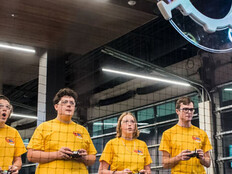Game Design Finds a ‘Sweet Spot’ with Education
Since the 1980s, teenagers have returned home from school to play video games, a pastime many parents consider a time-waster. Fast-forward 30 years and youths are now making games in school, in a new form of study that one teacher said is poised to flourish in the coming years.
Al Doyle came to the Dwight School in Manhattan with more than 30 years of teaching experience. But he said he found something unique when he began developing a tripartite curriculum that blends architecture, animation and game design.
"There are some kids – a lot of them tend to be athletes – who just don't enjoy traditional art but have a love and hunger for games, game design and all other kinds of digital media," Doyle says. "I designed this course to cover three areas that generally get neglected in school."
Doyle's classes explore the connective tissue among the three studies. After learning the fundamentals, students create their own games using these concepts. They may choose from several programming platforms, including Beta, Kandu, Flowlab, Unity, Atmosphir, Gamestar Mechanic and Game Maker. Some of these require knowledge of coding; others are almost purely visual.
Through this process of discovery, Doyle often sees students develop a passion that goes beyond the classroom walls.
"When you can get kids so excited about learning that they forget they're in school, and you tap into that natural curiosity, that hunger, that need to know, that's a sweet spot for a teacher, because then it becomes frictionless," Doyle says. "I've taught for 35 years, and I've never seen anything like it."
Startup Atmosphere
The class has drawn the attention of local game designers, who have toured the school to show off the games they're working on. Students get hands-on experience with the games and provide feedback. It creates an atmosphere that's a bit like a startup company, Doyle notes. That kind of experience may play directly into their lives beyond high school and can't be learned in many classes, he adds.
Hidden Level Games has been testing its game, Beta, with students at the Dwight School. According to Errol King, the company’s creative director, they have provided critical insight into how to make the game better while learning about how a game is made.
"Students provide invaluable feedback on how to improve Beta," King says. "Many of the recent updates made to Beta are based on gameplay stories told by students. By listening to them, we can accelerate their transition from player to creator."
Alexander Khazaneh, 15, a freshman at the school, said he didn't have a history with video games before coming to Doyle's classes but quickly began appreciating them for their artistry.
"You can make them into an art form," Khazaneh says. "I never really saw that before now. We've been working on Beta, which is a really simple game, but it can be a lot of fun just making very simple art."
Other students in Khazaneh's class, made up of about 20 freshmen, have a wide range of experience with game design. Some are able to use the more robust platform Unity, which is what many modern mobile games are developed on. And some use platforms that build visually, using logic and object placement.
Khazaneh said the class has made him consider game design as a career after high school, where he dreams of an industry that is driven more by fun than by profit.
"Why does money always have to come first?" he asks. "I'd rather people make games that are for the people, not just money."
Looking Ahead
In the future, Doyle hopes to have students take the next plunge into game design by trying out Oculus Rift, a virtual-reality headset whose development team was recently acquired by Facebook. Doyle sees that as the next frontier and wants teens to get a peek at what's ahead.
He also hopes to tap into New York City’s thriving culture of independent game design by visiting some of the so-called game jams, where game developers gather to work on themed projects over a short period.
"These classes are only going to grow as this art form grows and becomes more prominent," Doyle says. "No one questions the significance of game design anymore."








